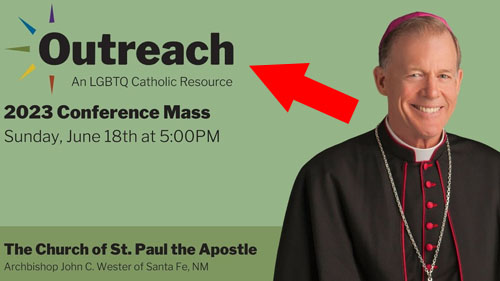| Recent Featured Videos and Articles | Eastern “Orthodoxy” Refuted | How To Avoid Sin | The Antichrist Identified! | What Fake Christians Get Wrong About Ephesians | Why So Many Can't Believe | “Magicians” Prove A Spiritual World Exists | Amazing Evidence For God | News Links |
| Vatican II “Catholic” Church Exposed | Steps To Convert | Outside The Church There Is No Salvation | E-Exchanges | The Holy Rosary | Padre Pio | Traditional Catholic Issues And Groups | Help Save Souls: Donate |  |









 " />
" /> " />
" /> " />
" /> " />
" /> " />
" />




Some Facts about Martin Luther, The Originator of Protestant “Christianity”
Protestantism originated with Martin Luther (1483-1546), an ex-Catholic. Even though Protestants would contend that they follow “true biblical Christianity,” and not a man, they are inclined to defend Martin Luther. This is because Martin Luther was the first identifiable spokesman for their version of “Christianity.” Prior to his separation from the Catholic Church in 1520, there was no public defender of what we now know to be Protestantism, the core doctrines of which are justification by faith alone and Scripture alone.
Even though Luther is the central figure in the history of Protestantism, few Protestants know much about him, or about how he came upon his beliefs. I invite the reader to consider the following facts.
PLEASE CONSIDER MARTIN LUTHER’S TRULY MAN-MADE JOURNEY TO PROTESTANTISM
Martin Luther was born in 1483 and baptized as a Catholic the next day. He entered an Augustinian Catholic friary in 1505, and was ordained a Catholic priest in 1507. Therefore, as a young professing Catholic priest, Protestantism was unknown to Martin Luther and indeed to the rest of the Christian world.
On Oct. 31, 1517, Martin Luther tacked his famous 95 Theses on the church door in Wittenberg, Germany. Most Protestants today cite this date as the beginning of the Protestant “reformation.” They think this represented Luther’s public stand for the Protestant faith, for “true and biblical Christianity.” What they don’t know is that Martin Luther’s famous 95 Theses acknowledged the office of the pope more than 20 times. At the time of the posting of the Theses – and indeed before it and for some time afterwards – Luther claimed to be a Catholic priest and monk. In his 95 Theses, Luther clearly acknowledges the office of the Pope as instituted by Christ, although he detracts from its dignity and powers in the matter of Indulgences.
The formal title for his 95 Theses is the Disputation of Doctor Martin Luther on the Power and Efficacy of Indulgences, Oct. 31, 1517. In addition to acknowledging the pope, numbers 25-29 of the Theses acknowledge Purgatory. Luther acknowledges the existence of Purgatory, although he departs from Catholic teaching in what he says about it. Luther also declares his belief in Indulgences, although he contradicts traditional Catholic doctrine on the issue. The following is typical of the contradictions exhibited by Luther.
The point here is that even on Oct. 31, 1517, the Protestant “faith” was still unknown to Martin Luther and indeed to the rest of the Christian world. There was no statement about justification by faith alone or Scripture alone; there was as yet no repudiation of the papal office or many other Catholic dogmas which Protestants today would reject. What you have, at this point, is a confused and convoluted priest who, while claiming to be Catholic, was clearly falling from the traditional Catholic faith into his own wild version of it (especially with regard to Indulgences). He was no Protestant. Even at this point, the so-called biblical “faith” was unknown to its eventual founder.
In 1518, Luther published a Sermon on Indulgences and Grace, in which he attacked the traditional way of dividing Penance into contrition, confession and satisfaction (Dr. Ludwig Pastor, History of the Popes, Vol. 7, pp. 355-356). Luther claimed it was not found in Holy Scripture. This, along with Luther’s contradiction of traditional Catholic teaching on Indulgences, prompted the Church to summon him to Rome for an investigation. (It should be noted that there were indeed some abuses by Church men on Indulgences. Such abuses represented a departure from Catholic teaching on the matter. Indulgences cannot be bought. Occasional abuses in this area – which were committed by a few Church men of a world-wide Church – in no way justify repudiating the traditional teaching. This teaching on Indulgences is rooted in the treasury of the merits of Jesus Christ and the saints, and the power of the keys given to St. Peter. According to Catholic teaching, Indulgences are given for certain specified good works or pious actions (such as prayers, etc.). They remove only the temporal punishment of already forgiven sins. They are not, as Protestants would suggest, a means to buy one’s way into Heaven.)
At the beginning of July 1518, Luther is presented with an official summons to appear in Rome and give an accounting of his doctrines. While maintaining his new (and heretical) views on Indulgences and Penance, Luther claims “that the Roman Church has always maintained the true faith, and that it is necessary for all Christians to be in unity of faith with her.” (Dr. Ludwig Pastor, History of the Popes, Vol. 7, p. 366.) That means that, even after having been summoned to Rome to answer for his new ideas, Luther professes that the Roman Church (the Roman Catholic Church) has the true faith. At this point, Luther is undoubtedly drifting into his own personalized view of “Christianity”; but he is still no Protestant, as his statement about the Roman Church demonstrates. The so-called pure, simple and “biblical faith” was still unknown to its eventual founder in July of 1518.
As Luther’s influence spread, and his commitment to new ideas hardened, the actions against him increased. Pope Leo X dispatched the learned Cardinal Cajetan to handle the case. Cajetan was to examine the situation and, if possible, get through to Luther. This occurred in the fall of 1518, but Luther remained obstinate. Despite his commitment to his new ideas, Luther declared the following at one of these interviews: “The notary read out a declaration on behalf of Luther, that as far as he could remember he [Luther] had never taught anything against Holy Scripture, the doctrines of the Church, the Papal decretals [decrees of the popes], or sound reason. But as he was a man subject to error, he submitted himself to the decisions of the Holy Church and to all who knew better than he did.” (Dr. Ludwig Pastor, History of the Popes, Vol. 7, p. 373.)
Once again, we see that Luther claims fidelity to papal teaching and to all of Catholic doctrine. He also appeals specifically to the pope, and expresses his willingness to retract if the pope decided against him (Ibid., pp. 375, 377). The so-called “biblical faith” (Protestantism) was still unknown to its eventual founder.
Not long after his meetings with Cajetan in November of 1518, Luther’s views underwent another significant development. He came to the conclusion that the pope, to whose decrees he had just claimed submission, is the antichrist. He writes: “I send you my trifling work that you may see whether I am not right in supposing that, according to Paul, the real Antichrist holds sway over the Roman court.” (De Wette, I., 192; Enders I., 317; Pastor, Vol. 7, pp. 378-379.) Numerous utterances from this time show that Luther had “fully formulated his proposition that the pope was antichrist.”
Yet, at this very time that he was calling the pope “the Antichrist,” Luther appealed to a general council from the pope (Luther’s works, Weimar ed., II., 36 seq.). In other words, Luther considered the decisions of general councils to be definitive and authoritative. This of course contradicts one of the pillars of Protestantism: Scripture alone.
Therefore, even at the point that Luther had firmly set his face against the Papacy as “the Antichrist,” he still hadn’t discovered Protestantism. The so-called “biblical faith” was still unknown to its eventual founder. One should consider this fact deeply; for it demonstrates that whenever Luther did come up with Protestantism, it was nothing more than the creation of a confused mind.
THESE FACTS DEMONSTRATE THAT ALL PROTESTANTS HAVE EMBRACED A PURELY MAN-CREATED RELIGION, WHICH LUTHER WAS INVENTING AND RE-INVENTING BY THE DAY
The true faith of Jesus Christ is a deposit. It does not fall out of the sky to a man who lives 15 centuries after Christ. It was revealed by Jesus Christ to His Apostles 2000 years ago, and it was passed on by the Apostles to the Church.
The true faith thus has a historical link to the apostolic Church; and it can be shown to have been believed by those who came before in the Church. It is passed on from generation to generation. Martin Luther grew up with the Catholic faith. Protestantism was unknown to him as a child; it was unknown to him as a priest; it was unknown to him when he posted his 95 Theses, and even when he first called the pope the Antichrist and was appealing to a general council. At some point, indeed, Martin Luther came up with Protestantism, and his conclusions had no link with his predecessors or even with what he had said or believed before. They were truly the inventions and “discoveries” of a man, Martin Luther.
Protestants have thus submitted themselves to a system which Martin Luther came up with among the rest of his contradictory and ever-changing views. These “discoveries” include the idea that man is justified by faith alone, which word for word contradicts the teaching of the Bible (James 2:24) – a contradiction so blatant that Luther felt compelled to criticize the book of James because it contradicted him. In fact, Luther wanted to throw James out of the Bible and into the stove (i.e., the fire), until his friends persuaded him that such a move would be too radical.
OUTRAGEOUS ACTIONS AND QUOTES OF MARTIN LUTHER –
HE CRITICIZES THE BOOK OF JAMES
Here we see the apostate priest, Martin Luther, denigrating the Book of James because it contradicts his new idea of justification by faith alone.
Martin Luther even added the word “alone” to Romans 3:28 in his German translation of the Bible. He made it say “faith alone,” when that is not in the text or what it means.
MARTIN LUTHER SAID A MAN COULD COMMIT FORNICATION AND MURDER 1000 TIMES A DAY AND NOT LOSE HIS JUSTIFICATION
Martin Luther also said that a man could commit fornication and murder 1000 times a day and would not lose his justification. He said this to express his doctrine of justification by faith alone: that is, no matter how much a person sins, he is still saved as long as he believes (by faith alone). In the same context, he declared: “be a sinner and sin boldly.” The authenticity of these quotes is not disputed, but openly admitted by Protestant defenders of Luther.
As mentioned previously, the true faith is a deposit. It doesn’t fall out of the sky for the first time to a man who lives 1500 years after Christ, and it doesn’t come from the abyss below – as Martin Luther’s teachings on justification, fornication and murder do.
LUTHER’S PREOCCUPATION WITH THE DEVIL AND CRUDE SUBJECTS
Martin Luther also had a preoccupation with the Devil, with the bathroom, and with matters one can only call disgusting. Even Protestant scholars have noted that Luther’s fascination with crude subjects is disquieting. He admittedly had much interaction with the Devil. “These [demons] would haunt the imagination of Martin Luther who had visions, which he believed to be actual physical occurrences, of the devil hurling [excrement] at him and his hurling it back. Indeed, in one of his many anal combats with the devil – in which Luther would challenge the devil to ‘lick’ his posterior – Luther thought the best tactic might be to ‘throw him into my anus, where he belongs.’” (H.W. Crocker, Triumph, Roseville, CA: Prima Publishing, 2001, p. 237.) After he had come to his position against the Papacy, Luther called the “Papal decretals the Devil’s excretals.” He also said that the pope and cardinals should be killed, and that he and his supporters should wash their “hands in their blood.” (Pastor, History of the Popes, Vol. 7, p. 393.)
Luther claims that he came up with justification by faith alone while on the toilet. He claims that it came as “knowledge the Holy Spirit gave me on the privy in the tower.” (Quoted in William Manchester, A World Lit only By Fire: The Medieval Mind and the Renaissance Little Brown & Co., 1993, p. 140.) In fact, Luther’s idea that people need to commit real and “honest” sins seems to have originated from a conversation with the Devil. This is from Luther’s Table Talk.
With these facts in mind, it should be quite clear how those who followed Luther’s eventual conclusions (the core of which are faith alone and Scripture alone) are simply following the machinations, inventions and discoveries of a man. They are following the inventions of a man who was guided and used by the Devil to create a false version of “Christianity” which would lead countless people astray.
Sign up for our free e-mail list to see future vaticancatholic.com videos and articles.
Recent Content
^